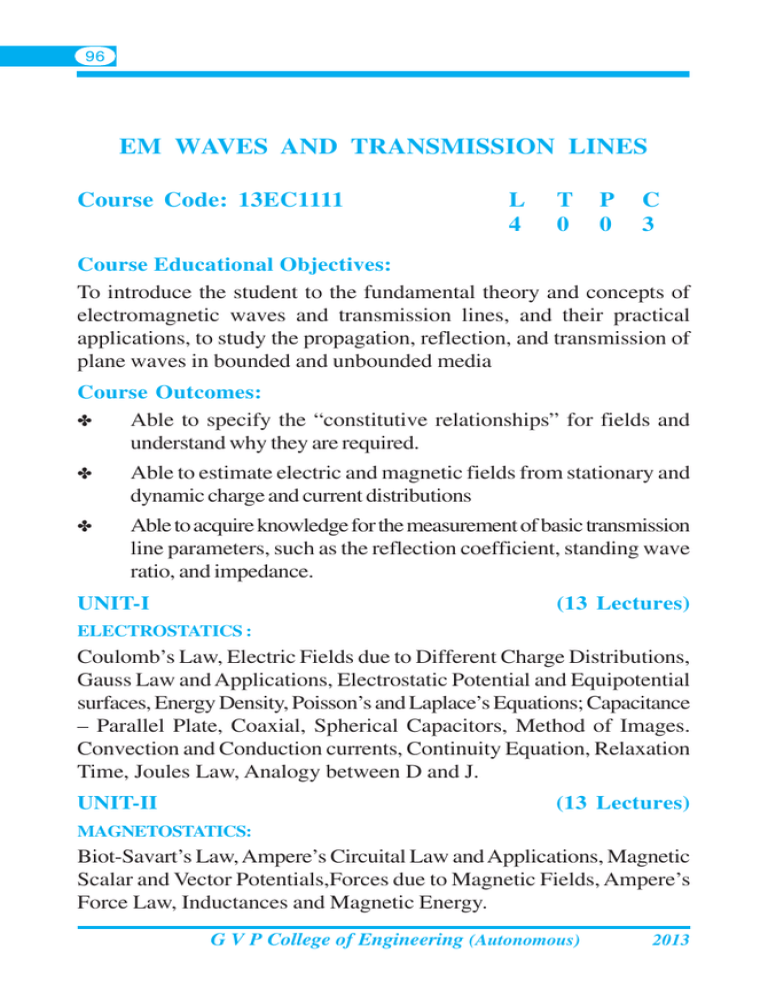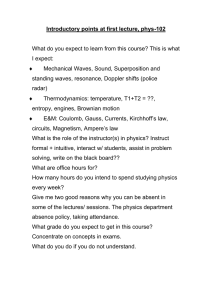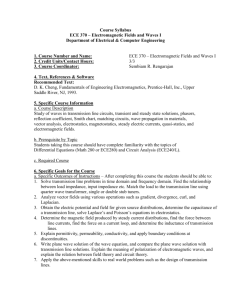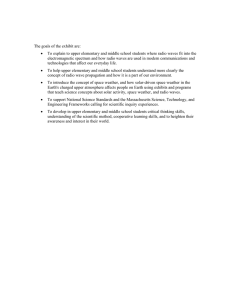EM WAVES AND TRANSMISSION LINES
advertisement

96 EM WAVES AND TRANSMISSION LINES Course Code: 13EC1111 L 4 T 0 P 0 C 3 Course Educational Objectives: To introduce the student to the fundamental theory and concepts of electromagnetic waves and transmission lines, and their practical applications, to study the propagation, reflection, and transmission of plane waves in bounded and unbounded media Course Outcomes: ✤ Able to specify the “constitutive relationships” for fields and understand why they are required. ✤ Able to estimate electric and magnetic fields from stationary and dynamic charge and current distributions ✤ Able to acquire knowledge for the measurement of basic transmission line parameters, such as the reflection coefficient, standing wave ratio, and impedance. UNIT-I (13 Lectures) ELECTROSTATICS : Coulomb’s Law, Electric Fields due to Different Charge Distributions, Gauss Law and Applications, Electrostatic Potential and Equipotential surfaces, Energy Density, Poisson’s and Laplace’s Equations; Capacitance – Parallel Plate, Coaxial, Spherical Capacitors, Method of Images. Convection and Conduction currents, Continuity Equation, Relaxation Time, Joules Law, Analogy between D and J. UNIT-II (13 Lectures) MAGNETOSTATICS: Biot-Savart’s Law, Ampere’s Circuital Law and Applications, Magnetic Scalar and Vector Potentials,Forces due to Magnetic Fields, Ampere’s Force Law, Inductances and Magnetic Energy. G V P College of Engineering (Autonomous) 2013 97 UNIT-III (8 Lectures) MAXWELL’S EQUATIONS (TIME VARYING FIELDS) : Faraday’s Law and Transformer emf, Inconsistency of Ampere’s Law and Displacement Current Density, Maxwell’s Equations in time domain and phasor domain, Boundary Conditions. UNIT-IV (12 Lectures) PLANE WAVE PROPAGATION: Helmhotz Equations- Wave Equations for Conducting and Perfect Dielectric Media. Uniform Plane Waves, Uniform Plane Wave Propagation in Lossless and Lossy Media. Conductors & Dielectrics – Characterization, Polarization, Behavior of plane waves at the interface of two media: Reflection and Refraction of Plane Waves – Normal and Oblique Incidences for both Perfect Conductor and Perfect Dielectrics, Brewster Angle, Critical Angle and Total Internal Reflection, Surface Impedance, Poynting Vector and Poynting Theorem. UNIT-V (14 Lectures) TRANSMISSION LINES: Transmission Line parameters and equations, Primary & Secondary Constants, Expressions for Characteristic Impedance, Propagation Constant, Phase and Group Velocities, Infinite Line Concepts, Input Impedance Relations, SC and OC Lines, Reflection Coefficient, VSWR, UHF Lines as Circuit Elements; ë/4, ë/2, ë/8 Lines – Impedance Transformations. Smith Chart – Configuration and Applications, Single and Double Stub Matching. TEXT BOOKS: 1. Matthew N.O. Sadiku, “Elements of Electromagnetics”, Oxford Univ. Press, 3rd Ed., 2001. 2. G.S.N. Raju, “Electromagnetic Field Theory and Transmission Lines”, Pearson Edn., 2005. 3. G. Sasi Bhushana Rao, “Electromagnetic Field Theory and Transmission Lines”, Wiley India Pvt. Ltd, 2012. G V P College of Engineering (Autonomous) 2013 98 REFERENCES: 1. E.C. Jordan and K.G. Balmain, “Electromagnetic Waves and Radiating Systems”, PHI, 2ndEd., 2000. 2. Nathan Ida, “Engineering Electromagnetics”, Springer (India) Pvt. Ltd., New Delhi, 2nd ed., 2005. 3. John D. Ryder, “Networks, Lines and Fields”, PHI, 2nd Edition., 1999. 4. William H. Hayt Jr. and John A. Buck, “Engineering Electromagnetics”, TMH, 7th Edition, 2006. 5. Umesh Sinha, “Transmission Lines and Networks”, Satya Prakashan (Tech. India Publications), New Delhi, 2001. pqr G V P College of Engineering (Autonomous) 2013


